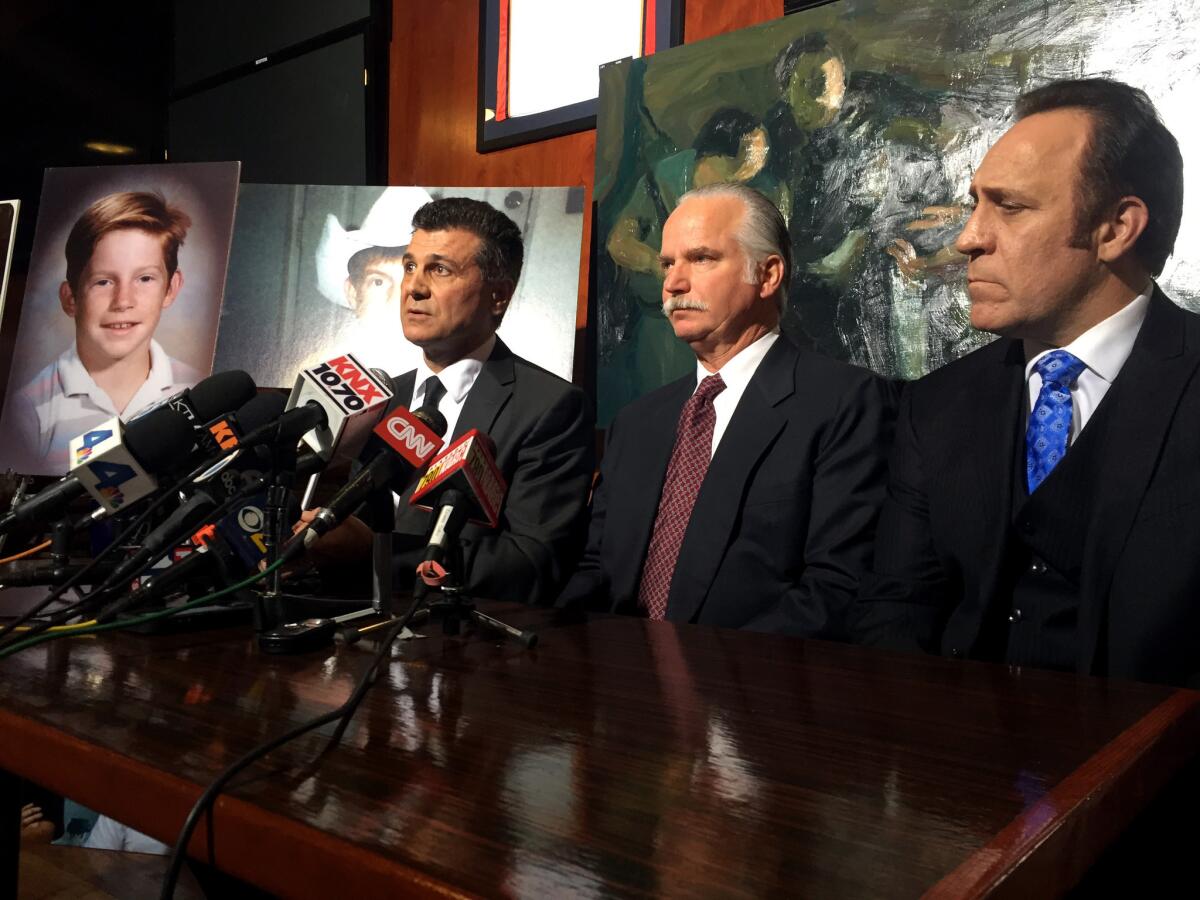$4.9-million settlement in death of mentally ill homeless man Kelly Thomas

Ron Thomas, center, is flanked by attorney’s Garo Mardirossian, left and Dale Galipo during a press conference Monday after a $4.9-million settlement was reached in the death of Thomas’ mentally ill homeless son, Kelly Thomas Monday, November 23, 2015. In 2011, Thomas, who suffered from schizophrenia, was beaten by Fullerton police when he wouldn’t follow their commands. He died a few days later.
- Share via
Closing the books on a case that sparked debate about how police deal with the mentally ill, the city of Fullerton agreed Monday to settle a civil case involving a homeless man who died in an altercation with officers.
The father of Kelly Thomas, who suffered from schizophrenia and died after an altercation with police, reached a $4.9-million settlement Monday, according to his lawyer.
Officials announced the settlement after a special closed-session Fullerton City Council meeting let out, the morning that opening statements in the civil suit were set to begin in Santa Ana.
City Atty. Richard Jones would not confirm the amount until it had been approved by the city’s insurers. Attorneys for Kelly Thomas’ father, Ron Thomas, confirmed the amount.
“The contemplated settlement has been negotiated by the city’s insurers and has been reviewed by the city,” Jones said in a statement. “No city funds are involved in this settlement.”
Dana Fox, who represented the city in the case, said the settlement “provides peace for both sides and avoids a protracted trial that would have been difficult for all.” He stressed that the city did not admit any liability or fault.
In 2011, Thomas was beaten by Fullerton police when he wouldn’t follow their commands. He died a few days later.
Thomas’ death incited outrage and elicited protests, memorials and even a recall election of Fullerton council members.
“Although the city would like to say it’s not admitting liability, the reality is when you’re paying $4.9 million … that speaks loudly and clearly and in volume,” said Garo Mardirossian, attorney for Thomas’ father. “The act of having agreed to pay that large amount is a tacit admission, whether they admit it or not.”
Mardirossian said he was prepared to bring his first witness, former Fullerton Police Officer Manuel Ramos, on Monday.
Ramos and former Fullerton Officer Jay Cicinelli were found not guilty in a criminal trial last year. Charges against a third officer were dropped.
An emotional Ron Thomas, with a backdrop of about a dozen photos of his son as a young man on display on stands, spoke to reporters Monday at Mardirossian’s office.
Ron Thomas said he had “absolutely wanted” to see the officers involved in the case testify, something they did not do in the criminal trial, but felt going through with the emotional stress of a trial would not have been worth the end result.
“Considering this would have gone to appeals afterward if a verdict was reached by a jury, the years it would have prolonged, what would we have gained?” Thomas said. “We still know they did it.”
Ron Thomas, a former cop who came from a line of cops and has been very vocal in the last four years about bringing justice for his son, said he did yet not have plans for what he would do with the settlement money.
“I feel there are still many problems out there, just as we felt it’s getting better,” he said.”
He added that he planned to continue working with charities and other organizations and pushing for fair policing, improved treatment for the mentally ill and policy reform, especially peace officers’ bill of rights laws, state laws that generally allow officers a certain amount of time before they must talk to investigators.
“It’s been a long road,” Thomas said at the news conference, then paused and continued, “a very emotional road. But as I’ve always said, no matter what I’ve had to go through, it’s nothing compared to what Kelly went through. Nothing.”
The Thomas case generated national attention, in part because the incident was captured on grainy video and the officers’ audio recording devices.
Prosecutors argued that the videotape clearly presents a confused and vulnerable Thomas who died because one bully cop picked a fight and another lost control and slammed Thomas in the face repeatedly with his stun gun. Defense attorneys said video captures a violent and errant street person who gave police the fight of their lives.
A toxicology report said that the 37-year-old Thomas didn’t have any drugs or alcohol in his system the night of the confrontation.
In the wake of the Thomas case, Orange County officials in 2014 adopted Laura’s Law, which allows court-ordered involuntary outpatient mental health treatment for those who are severely ill and have had multiple incarcerations or hospitalizations but refused voluntary treatment.
Thomas’ mother, Cathy Thomas, accepted a $1-million settlement from the city in May 2012.
ALSO
Holiday travelers be warned: Huge snowstorm coming to Sierra Nevada
Firm that teaches ‘life skills’ to suspected shoplifters extorts them, suit alleges
Study: One-third of nation’s 30 worst traffic bottlenecks are in Los Angeles area
More to Read
Sign up for Essential California
The most important California stories and recommendations in your inbox every morning.
You may occasionally receive promotional content from the Los Angeles Times.











